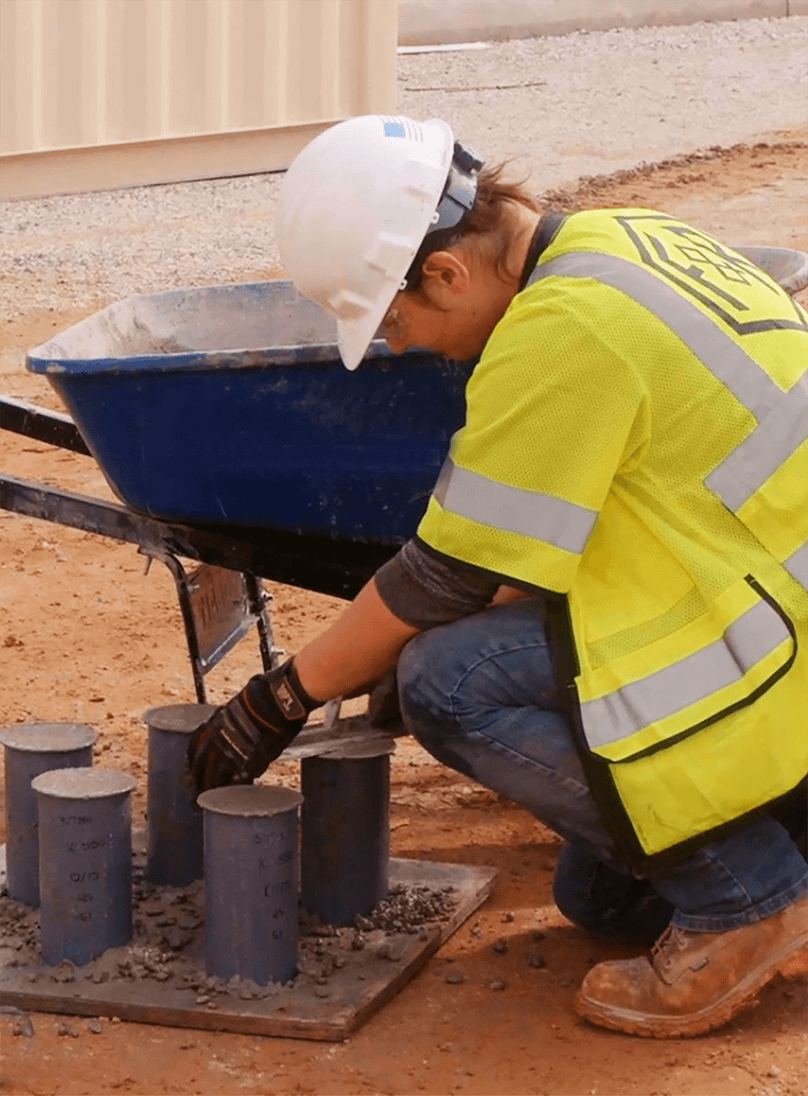CMT and Special Inspections Services
Construction Materials Testing (CMT) is designed to document and confirm that the construction materials used to raise a bridge, build a highway, or construct your building fulfill design requirements, meet building codes and regulations, and document that each structure is strong enough for the job for which it’s designed. Special Inspections are “inspections and tests related to construction materials and construction methods on all applicable projects” as defined in Chapter 17, Section 1705 of the International Building Code (IBC). CMT and Special Inspections services are intended to provide you with the peace of mind that comes with knowing our team is at the site, looking out not only for your best interests, but also for the safety of each end user.

Safety Through Scrutiny
F&R has performed CMT and Special Inspections services on tens of thousands of projects throughout the Mid-Atlantic. Our expertise and experience enable us to integrate both disciplines, reducing testing and inspection redundancies, improving efficiency, and lowering client costs. We test soils, concrete, masonry, structural steel, fireproofing, and many more.
F&R’s experienced staff includes AWS/CWI Inspectors and certified Nondestructive Testing (NDT) professionals. Our field and laboratory technicians hold relevant certifications, including AWS, ASNT, ICC, NICET, ACI, DOT, and other certifications in soils, concrete, asphalt, erosion control, radiography, ultrasonic inspection, and other related disciplines. We also maintain an in-house training program, so that each technician has the necessary knowledge, credentials, and experience to identify and document compliance with applicable codes and approved construction documents.

F&R’s full-service materials laboratories hold the applicable industry accreditations, with several holding AASHTO Accreditation, ensuring the accuracy and reliability of our testing services. Full accreditation information is available upon request; click here to view F&R’s AASHTO Accreditation information. Our in-house laboratories ensure that your project timelines and budgets will not be disrupted by subcontract mobilization or laboratory delays.
Special inspections (SIs) include both testing and inspection of materials, as well as the installation, fabrication, erection, or placement of construction components and connections. There are hundreds of standards in the International Building Code (IBC) Chapter 17 that are considered Special Inspections. Because they are integrated into the IBC, they are enforceable parts of the code. It is critical to your project’s success that you select a company that understands the complexity of these codes, how they apply to your project, and how these SI codes can help protect you against liability and promote the health and safety of your project’s end users.
Check out our Speaking in Code articles on the News & Resources Page for more insight on Special Inspections.
Safety Through Scrutiny

F&R has performed CMT and Special Inspections on tens of thousands of projects throughout the Mid-Atlantic. This experience and expertise enables us to integrate both disciplines, thus reducing testing and inspection redundancies improving efficiency, and reducing client costs. We test soils, concrete, masonry, structural steel, fireproofing, and more.
F&R staff includes AWS/CWI Inspectors and certified Nondestructive Testing (NDT) professionals. Our field and laboratory technicians obtain relevant certifications, such as AWS, ASNT, ICC, NICET, ACI, DOT, and other certifications in soils, concrete, asphalt, erosion control, radiography, ultrasonic inspection, and a host of other relevant disciplines. We also maintain an in-house training program to confirm that each technician has the knowledge credentials and experience necessary to identify and document compliance with the applicable codes and approved construction documents.

F&R’s full-service materials laboratories hold the applicable industry accreditations, with several holding AASHTO Accreditation, ensuring the accuracy and reliability of our testing services. Full accreditation information is available upon request; click here to view F&R’s AASHTO Accreditation information. Our in-house laboratories ensure that your project timelines and budgets will not be disrupted by subcontract mobilization or laboratory delays.
Special inspections (SI) includes both testing and inspection of the materials, installation, fabrication, erection or placement of construction components and connections. There are hundreds of standards that are incorporated into International Building Code (IBC) Chapter 17 that are considered Special Inspections. The fact that they are incorporated into the IBC means they are enforceable parts of the code. It is critical to you project’s success that you select a company that understands the complexity of these codes, how they apply to your project, and how these SI codes can help protect you against liability and promote the health and safety of your project’s end users.
Check out our Speaking in Code articles on the News & Resources Page for more insight on Special Inspections.
CMT/SI Scope of Work
- Soils – Laboratory Testing of Soil and Aggregate, Field verification of Material Placement, compaction/density Testing, and Fill placement observation.
- Concrete – reinforcing steel placement, compressive strength tests, slump and air content tests, temperature, verification of approved mix design arrival to site, location of placement, drill and epoxy anchor inspections, anchor pull testing.
- Asphalt – placement, temperature recording, field compaction testing, sampling for asphalt bulk specific gravity testing, verification of arrived mix design.
- Structural Steel – welded and bolted connections (structural steel, joists, and decking), Radiographic Inspections, nondestructive testing (Ultrasonic Testing {UT}, Magnetic Particle Testing {MT}, and Penetrant Testing {PT}), destructive testing, fabricator shop inspections.
- Foundations – Shallow, Deep, and Intermediate Foundation testing/observation
- Masonry – grout spacing, consolidation observations, sampling and compressive strength testing.
- Sprayed Fire Resistive Material (SFRM) – thickness testing, adhesion testing, and density testing.
- Waterproofing – observation of material application and systems
- Exterior Insulation and Finish Systems (EIFS)
